
- STARTUP COURSE AND DOCUMENTS
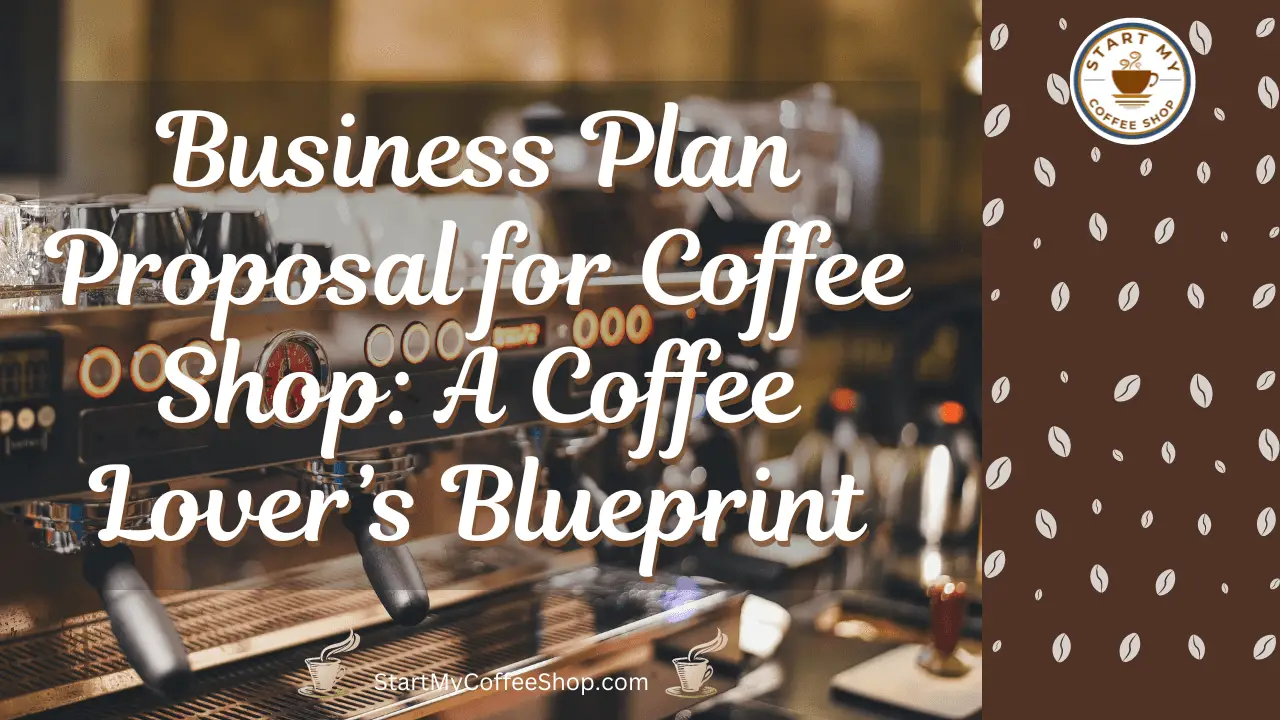

Business Plan Proposal for Coffee Shop: A Coffee Lover’s Blueprint
Coffee shops have become more than just places to grab a quick cup of joe. They have evolved into social hubs, community gathering spots, and creative sanctuaries. With the ever-increasing demand for high-quality coffee and the rise of the café culture, opening a coffee shop presents a compelling entrepreneurial opportunity.
A business plan proposal for a coffee shop covers market analysis, unique selling proposition, menu, location, marketing, operations, and financial projections. Brew with a strong comprehensive plan to win the hearts of the coffee industry!
In this article, I will outline the key components necessary for launching and running a great coffee shop.
Table of Contents
1. Executive Summary

Additionally, the executive summary delves into your target market, identifying the specific demographics, preferences, and needs of your potential customers. It highlights the competitive advantage your coffee shop possesses, whether it’s through superior quality, innovative offerings, exceptional customer service, or a combination of factors that sets you apart from existing market players.
Furthermore, the executive summary includes a glimpse into your financial projections, showcasing the potential profitability and return on investment for interested parties. By providing a snapshot of the anticipated revenue, expenses, and profitability, you can attract potential investors and partners who are keen to support your coffee shop venture.
In essence, the executive summary acts as a captivating hook, designed to pique the interest of potential investors and partners by succinctly communicating the most compelling aspects of your coffee shop business plan. It serves as a persuasive tool, enticing stakeholders to delve further into the details of your comprehensive proposal.
Read more about: Business Plan for Small Coffee and Juice Shop: Juice Up Your Business
2. Market Analysis
In order to achieve greatness in the coffee industry, a deep understanding of the market and target audience is essential. Conducting a comprehensive market analysis becomes the foundation for making informed business decisions. By analyzing the industry, you can identify emerging trends that shape consumer preferences and demands. This knowledge enables you to tailor your offerings and stay ahead of the competition.
Examining local demographics is another critical aspect of market analysis. Understanding the age groups, income levels, and lifestyle preferences of the target market allows you to align your coffee shop’s offerings with their specific needs and desires. For example, if the area has a younger population with a preference for specialty coffee, you can focus on providing unique and artisanal coffee options.
Furthermore, evaluating the competitive landscape helps identify gaps and opportunities for your coffee shop. By studying existing competitors, you can learn from their strengths and weaknesses and position your business strategically. This analysis enables you to offer something different or better than your competitors, whether it’s through superior quality, innovative products, or exceptional customer service.
3. Unique Selling Proposition (USP)
In a highly saturated market, setting your coffee shop apart from the competition is crucial. To achieve this, it is vital to define and emphasize your coffee shop’s unique selling proposition (USP). Your USP is what distinguishes your business and makes it stand out in the minds of customers.
Consider various factors that can contribute to your USP. It could be a specific coffee brewing method that creates a distinct flavor profile, a signature blend crafted from premium beans sourced directly from growers, or a strong commitment to sustainability and ethical sourcing practices. Whatever aspect you choose, it should be something that resonates with your target audience and aligns with their values and preferences.
Once you have defined your USP, the next step is to clearly communicate it to your target customers. Incorporate your USP into your branding, marketing materials, and messaging. Highlight it in your menu descriptions, signage, and social media presence. By effectively communicating your USP, you create awareness and attract customers who are specifically looking for what your coffee shop offers.
Your USP becomes the foundation of your coffee shop’s identity and serves as a compelling reason for customers to choose your establishment over competitors.
4. Menu and Product Offering

Expanding beyond beverages, it is beneficial to develop a selection of artisanal pastries, light meals, and healthy snack options. Freshly baked croissants, muffins, and scones can complement the coffee offerings and entice customers with their delicious aroma. Additionally, offering options like salads, sandwiches, and wraps caters to those seeking a light and satisfying meal.
To appeal to conscious consumers, emphasize the quality and sourcing of your ingredients. Highlight any organic or locally sourced components used in your menu items. Transparently communicate your commitment to sustainable and ethical practices, such as fair trade coffee beans or environmentally friendly packaging.
You create a coffee shop that appeals to a broad range of customers by curating a diverse menu that incorporates various brewing methods, artisanal pastries, light meals, and conscious ingredient sourcing. This attention to variety and quality enhances the overall coffee experience and fosters customer satisfaction and loyalty.
Read more about: Business Plan for Selling Coffee: Wake Up and Smell Business
5. Location and Facilities
Seek out areas with bustling foot traffic, such as busy shopping districts or near offices and educational institutions, to maximize visibility and attract potential customers. Additionally, a vibrant community atmosphere can contribute to a steady flow of patrons.
When evaluating potential locations, carefully consider the size of the space. It should be spacious enough to accommodate both seating areas for customers and a well-organized production area for coffee preparation. This ensures efficient workflow and a comfortable environment for both staff and customers.
Creating an inviting ambiance is equally important. Opt for comfortable seating arrangements that encourage customers to relax and enjoy their coffee. Incorporate aesthetic decor that aligns with your brand image, creating a visually appealing and memorable atmosphere. Maximizing natural light not only enhances the overall ambiance but also contributes to a pleasant and welcoming environment.
A strategically chosen location with high foot traffic, proximity to key establishments, and a warm and inviting ambiance sets the stage for attracting customers and fostering a loyal customer base.
6. Marketing and Promotion
To ensure the longevity of your coffee shop, it is essential to develop a robust marketing strategy that effectively raises awareness and attracts customers. A combination of online and offline marketing channels can be leveraged to reach a broader audience.
Online platforms, such as social media, play a crucial role in modern marketing. Utilize platforms like Facebook, Instagram, and Twitter to showcase your coffee offerings, share engaging content, and interact with customers. Consider running targeted ad campaigns to reach specific demographics in your area. Additionally, collaborating with local influencers or establishing partnerships with complementary businesses can expand your online reach and tap into new customer segments.
Offline marketing efforts can be equally effective. Participating in community events or sponsoring local initiatives helps to build brand recognition and foster connections within the community. Distribute flyers, place ads in local publications, and engage in word-of-mouth marketing to reach potential customers in your vicinity.
Engaging with customers is key to building loyalty. Implement loyalty programs that reward repeat visits and offer personalized discounts. Regularly introduce specials, seasonal promotions, or limited-time offers to keep customers engaged and entice them to try new offerings.
7. Operations and Management
When outlining the operational aspects of your coffee shop, it is crucial to address staffing, training, and day-to-day processes. Clearly define roles and responsibilities for each team member, placing strong emphasis on providing exceptional customer service and product knowledge. Implement efficient inventory management systems to ensure a smooth supply chain and establish reliable relationships with suppliers.
Prioritize staff development and continuous improvement through regular training and feedback sessions to maintain a consistently high standard of service. By effectively managing these operational aspects, your coffee shop can create a positive work environment, deliver exceptional customer experiences, and establish a strong foundation for long-term growth.
Read more about: Business Plan for Selling Coffee Online: From Farm to Digital Cup
8. Financial Projections
To ensure the financial stability of your coffee shop, it is crucial to create a detailed financial plan. Consider all startup costs, including equipment, renovations, permits, licenses, marketing expenses, and working capital.
Project your revenue based on estimated daily sales, factoring in pricing, average customer spend, and the number of transactions. It’s essential to conduct a break-even analysis to determine the point at which your sales cover all expenses.
Additionally, outline your profitability targets and set financial goals to drive growth and sustainability. By meticulously planning your finances and regularly monitoring your performance, you can make informed decisions, optimize your operations, and achieve long-term profitability for your coffee shop.
9. Risk Assessment
By anticipating these risks, you can develop contingency plans and strategies to mitigate their impact.
One potential risk is changes in consumer behavior. Stay updated on trends and preferences within the coffee industry to ensure your offerings align with evolving customer demands. Additionally, intense competition is a constant challenge. Differentiate your coffee shop through unique offerings, exceptional customer service, or targeted marketing campaigns to stand out from the competition.
Unforeseen events can also pose risks, such as pandemics or economic downturns. In response to such challenges, develop contingency plans that allow your coffee shop to adapt and thrive. This could involve diversifying revenue streams, such as offering online ordering or delivery services, or implementing cost-cutting measures during lean times.
Regularly reassess and update your risk management strategies to stay prepared for any potential challenges that may arise. By being proactive and agile in your approach, you can effectively navigate risks and position your coffee shop for long-term achievement even in the face of uncertainties.
Opening a coffee shop requires careful planning, attention to detail, and a passion for providing an exceptional coffee experience. By crafting a comprehensive business plan that addresses market analysis, differentiation, operations, and financial projections, you will be well-positioned to navigate the competitive landscape and brew popularity in the coffee industry.
Frequently Asked Questions
Q: how much does it cost to open a coffee shop.
A: The cost of opening a coffee shop can vary depending on factors such as location, size, equipment, and renovations. On average, it can range from $80,000 to $300,000.
Q: Do I need prior experience in the coffee industry to start a coffee shop?
A: While prior experience can be beneficial, it is not a requirement. With proper research, training, and a passion for coffee, you can learn the necessary skills and knowledge to run a great coffee shop.
Q: What permits and licenses are needed to open a coffee shop?
A: Generally, you will need business licenses, health permits, food handling permits, and possibly liquor licenses if you plan to serve alcohol. It’s important to research and comply with local regulations.
To learn more on how to start your own coffee shop, check out my startup documents here.
Disclaimer: The information provided by StartMyCoffeeShop.com (“The Site”) is for general informational purposes only. All information on the Site is provided in good faith. However, we make no representation or warranty of any kind, express or implied, regarding the accuracy, adequacy, validity, reliability, availability, or completeness of any information on the Site. Under no circumstance shall we have any liability to you for any loss or damage of any kind incurred as a result of the use of the Site or Reliance on any information provided on the Site. Your use of the Site and reliance on any information on the Site is solely at your own risk. This blog post is for educational purposes only and does not constitute legal advice. Please consult a legal expert to address your specific needs. Terms and Conditions. ( https://startmycoffeeshop.com/terms-and-conditions/ )

Hi! I’m Shawn Chun
My adventure in coffee began when I first launched my first coffee shop back in the early 2000s. I had to figure out so many things on my own and to make it worse within 2 years of opening two large corporate coffee chains moved in just blocks away from me!
As I saw smaller and even some larger coffee shops in the neighborhood slowly lose customers to these giant coffee chains and slowly close up shop, I knew that I had to start getting creative…or go out of business.
I (like you may be) knew the coffee industry well. I could make the best latte art around and the foam on my caps was the fluffiest you have ever seen. I even had the best state-of-the-art 2 group digital Nuova Simonelli machine money could buy. But I knew that these things alone would not be enough to lure customers away from the name brand established coffee shops.
Eventually, through lots of trial and error as well as perseverance and creativity I did find a way to not only survive but also thrive in the coffee/espresso industry even while those corporate coffee chains stayed put. During those years I learned to adapt and always faced new challenges. It was not always easy, however, in the end, I was the sole survivor independent coffee shop within a 10-mile radius of my location. Just two corporate coffee chains and I were left after that year. All told the corporate coffee chains took down over 15 small independent coffee shops and kiosks and I was the last one standing and thriving.
Along the years I meet others with the same passion for coffee and I quickly learned that it is not only “how good a barista is” that makes a coffee shop successful, but the business side of coffee as well.
Hence why I started this website you are on now. To provide the tools and resources for up and coming coffee shop owners to gain that vital insight and knowledge on how to start a coffee shop successfully.
Stick around, browse through my helpful blog and resources and enjoy your stay! With lots of LATTE LOVE!
Share This Story, Choose Your Platform!
Related posts.

Best Ways to Implement Sustainable Practices in Your Coffee Shop

How to Host Events at Your Coffee Shop

Best Coffee Shop Loyalty Programs to Implement

Infusing Style and Substance: A Blueprint for Coffee Shop Design

Infusing Comfort and Charm: Small Coffee Shop Design Concepts
Coffee shop business plan template + PDF
This guide introduces an innovative AI Business Plan Generator template, specifically designed for entrepreneurs eager to launch or expand their coffee shop ventures. It's important to note that the names and financial projections provided in this example are purely for illustrative purposes, serving as educational resources to guide you through your business planning process. These examples are carefully selected to show how you can customize your own AI-generated Coffee Shop Business Plan, empowering you to overcome obstacles and seize opportunities in the coffee shop sector.
For those seeking a tailored approach, we offer a downloadable 'Coffee Shop Business Plan PDF' . This document is crucial for entrepreneurs committed to developing a compelling and effective strategy for starting or growing their coffee shop business. The 'AI Business Plan Generator' acts as a comprehensive guide, providing in-depth insights into the coffee shop market. It equips you with the essential tools to skillfully manage and grow your coffee shop business, leveraging the power of AI for unparalleled strategic planning.
How this coffee shop business plan sample was created
Easily develop your customized coffee shop business plan with our AI Business Plan Generator. Simply click 'Generate your business plan' and answer a series of targeted questions about your coffee shop project. Our advanced AI technology will assess your responses to produce a business plan that perfectly matches the goals and requirements of your coffee shop business. This efficient and straightforward process takes only 5-10 minutes, resulting in a comprehensive and well-organized plan. Our platform allows for adjustments and refinements to your plan, ensuring it accurately embodies your unique vision for your coffee shop venture. Once completed, your plan is ready for download, offering a clear and detailed guide for launching and expanding your coffee shop business. Leverage the power of our AI business plan generator, specially designed for coffee shop businesses, to boost your strategic planning efforts.

Coffee shop business plan sample
Executive summary, business description, market research and analysis, swot analysis.
- Organizational Structure and Management Team
Products or Services
Marketing and sales strategy, operations plan, financial projections, risk analysis.

Nestled in the vibrant heart of Portland, Oregon, Roast & Revel Coffee Shop emerges as a beacon of artisanal excellence and community spirit in a city celebrated for its rich coffee culture. With an unwavering commitment to quality, innovation, and social connectivity, Roast & Revel is poised to redefine the coffee experience, blending the art of coffee-making with the warmth of community gathering. This executive summary outlines Roast & Revel’s strategic direction, key offerings, competitive landscape, financial projections, and the dedicated team leading this venture.
The Concept and Industry
Roast & Revel Coffee Shop is more than just a coffee shop; it is a destination where the craft of coffee and community converge. Offering an array of high-quality, artisan coffee blends along with specialty teas, freshly baked pastries, and light meals, Roast & Revel caters to the discerning tastes of professionals aged 25-45, college students, and local residents. Situated in an industry that thrives on innovation and connection, Roast & Revel sets itself apart with its unique blends, like the “Morning Zen Blend” and “Caramel Swirl Indulgence,” and its community-centric ambiance that fosters both productivity and relaxation.
Market Analysis and Strategy
Our in-depth market analysis reveals a growing demand for premium coffee experiences and spaces that serve as community hubs. Roast & Revel’s target market includes a broad spectrum of customers, from young professionals seeking a conducive work environment to students and locals in search of a cozy gathering space. Our marketing and sales strategy leverages social media engagement, local SEO optimization, participation in community events, a loyalty program, and innovative collaborations to build brand awareness and customer loyalty. Additionally, our subscription service for freshly roasted beans and online ordering capabilities cater to the increasing desire for convenience among our target demographic.
Competitive Landscape and Differentiators
Roast & Revel enters a competitive landscape marked by established coffee chains and independent cafes such as Brewed Awakenings Café and Java Jive Coffee House. Our differentiators lie in our artisanal product range, superior customer service, and a focus on sustainability and local sourcing. Unlike our competitors, Roast & Revel places a strong emphasis on community engagement, hosting events and workshops that resonate with our customer base’s values and interests.
Operational Excellence
At the core of Roast & Revel’s operational plan is a commitment to excellence and efficiency. Our operations are underpinned by a streamlined workflow, from meticulous bean selection and roasting to customer service and inventory management. We prioritize sustainability in our supply chain and adopt best practices in quality control, ensuring every cup of coffee meets our high standards. Our facilities are equipped with state-of-the-art equipment, and our team receives ongoing training to stay ahead of industry trends.
Financial Outlook
Roast & Revel anticipates a promising financial trajectory, with projected revenues increasing from $250,000 in year one to $600,000 in year five, alongside improving net profit margins from 10% to 20%. These projections are supported by aggressive marketing, menu diversification, and an expanding customer base. Our break-even analysis indicates viability within the first year, a testament to our strategic planning and market demand.
The Team Behind Roast & Revel
Leading Roast & Revel’s journey are industry veterans and passionate visionaries, including Emily Clark, our General Manager with over a decade of coffee industry experience, and Jordan Lee, our award-winning Head Barista. Supported by Alexa Kim, our innovative Marketing Manager, and Charlie Morgan, our Operations Manager with a knack for efficiency and sustainability, our team is our greatest asset.
Roast & Revel Coffee Shop stands on the threshold of transforming Portland’s coffee scene through its unwavering dedication to quality, community, and sustainability. With a solid strategic foundation, a deep understanding of our market, and a team unmatched in talent and passion, Roast & Revel is set to brew not just coffee, but also a richer, more connected community experience.
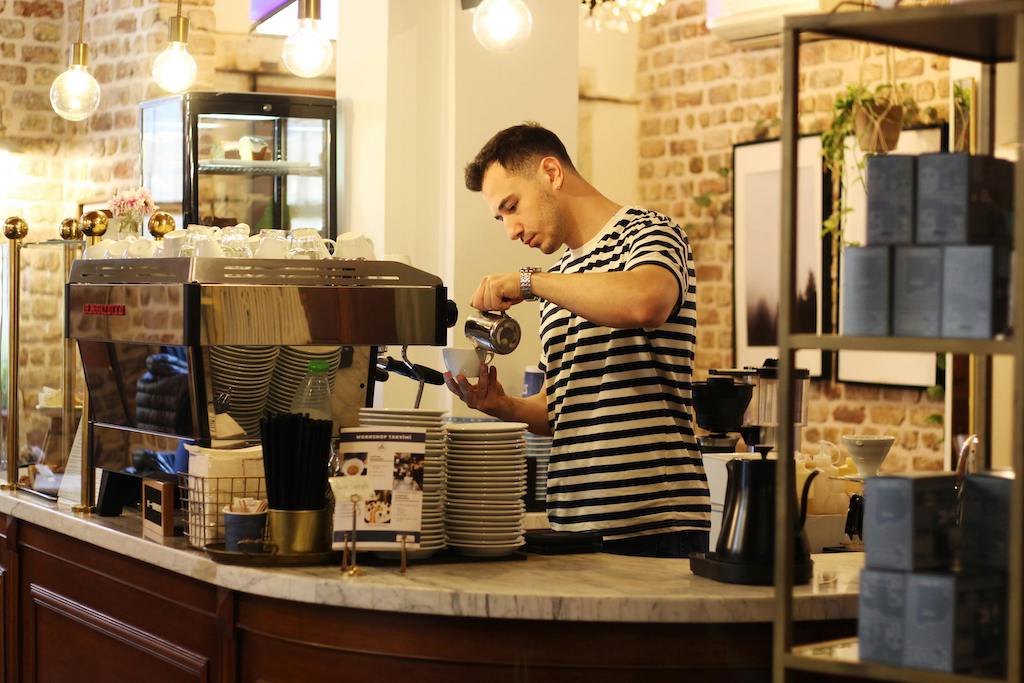
successful coffee shop business plan pdf
"Roast & Revel Coffee Shop" is nestled in the heart of Portland, Oregon, a city renowned for its vibrant coffee culture and community-centric locales. Our establishment is positioned not just as a coffee shop but as a sanctuary for coffee aficionates and casual drinkers alike, aiming to serve as the go-to spot for those seeking premium coffee experiences. The coffee shop industry, dynamic and ever-evolving, caters to a wide audience ranging from professionals seeking a quiet place to work, students looking for a study haven, to local residents desiring a warm cup and a welcoming atmosphere. Within this bustling industry, "Roast & Revel" stands out by offering not only high-quality, artisan coffee but also a space where the community can gather, share ideas, and revel in the joy of coffee.
The inception of "Roast & Revel" stemmed from a simple yet profound desire to create a space that encapsulates the essence of Portland's coffee scene while pushing the boundaries of traditional coffee offerings. Recognizing the growing demand for sophisticated and diverse coffee options coupled with a cozy ambiance, the founders embarked on this adventure in the year 2021. The aim was not merely to start a business but to weave into the fabric of the community, providing a space that feels like home to all who enter.
Our mission is "To brew not just coffee, but also community and connections, one cup at a time." This statement reflects our core philosophy of fostering a welcoming space where the love for meticulously roasted coffee and the warmth of community converge. We strive to be more than just a coffee shop; we aim to be a hub of creativity, relaxation, and inclusivity, where every guest feels valued and inspired.
Legally, "Roast & Revel Coffee Shop" is structured as a Limited Liability Company (LLC). This formation allows for flexible management structures while providing personal liability protection for its members, fostering an environment conducive to growth and innovation. This legal structure supports our vision of creating a lasting brand that not only serves excellent coffee but also contributes positively to our community and employees.
Looking toward the long-term potential of "Roast & Revel" , we see a future bright with possibilities. The coffee industry shows no signs of slowing down, with an increasing number of consumers seeking out specialty coffee and unique café experiences. Our business is poised for growth, leveraging Portland's rich coffee culture and our unique value proposition. We envision expanding our footprint, both physically in terms of new locations and digitally through an enhanced online presence, including e-commerce for our specialty blends. Further, we aim to deepen our community engagement through events, workshops, and partnerships with local businesses and artists, reinforcing our role as a community hub.
Our commitment to quality, community, and sustainability sets the foundation for a business with enduring appeal. By staying true to our mission and continually adapting to the evolving tastes and preferences of our customers, we believe "Roast & Revel Coffee Shop" will not only thrive but also set new standards in the coffee industry. As we look to the future, our goal remains clear: to serve as a beacon of warmth and excellence in Portland's coffee scene, inviting people from all walks of life to roast, revel, and rejoice in the simple pleasures that a great cup of coffee can bring.
coffee shop business plan pdf
The coffee shop industry, characterized by its robust and adaptive nature, continues to flourish, driven by evolving consumer preferences and the growing appreciation for artisanal and specialty coffee. Recent trends indicate a shift towards premiumization, with consumers willing to pay higher prices for superior quality, ethically sourced coffees, and unique coffee experiences. The industry has also seen a rise in demand for coffee shops that serve as community hubs, offering not just beverages but a conducive environment for work and social interaction. The U.S. coffee shop market is expansive, with a revenue exceeding $45 billion in 2022, expected to grow annually by 4.5% through to 2025. This growth trajectory is fueled by increasing coffee consumption and the integral role coffee shops play in modern social and professional life.
"Roast & Revel Coffee Shop" is strategically positioned to serve a diverse target market within Portland, Oregon, which includes professionals aged 25-45, college students, and local residents. This demographic is particularly attractive due to their disposable income, propensity to frequent coffee shops, and value for premium coffee. The size of this target market within Portland is substantial, offering significant growth potential, especially considering the city's reputation for its vibrant coffee culture and the high premium placed on community and quality by its residents.
The market’s needs and demands are multifaceted, extending beyond the coffee itself to include the desire for a comfortable and welcoming space where individuals can unwind or work. Customers are looking for a premium coffee experience that goes beyond the traditional cup of joe to include diverse artisanal blends, sustainable and ethically sourced products, and innovative beverage options. Additionally, there is a growing demand for locations that can host community events, provide a conducive work environment, and foster social connections.
Market trends underscore the importance of sustainability and ethical sourcing, with consumers increasingly motivated by the story behind their coffee. There's also a noticeable preference for coffee shops that leverage technology, offering convenient ordering, payment options, and loyalty programs. Moreover, amidst the digital age, the role of social media in influencing consumer choices cannot be overstated, with visually appealing drinks and spaces becoming a significant draw.
The main competitors for "Roast & Revel Coffee Shop" in Portland include establishments like Brewed Awakenings Café, Java Jive Coffee House, and The Daily Grind Espresso Bar, among others. These competitors offer insights into the market's dynamics, each presenting distinct strengths such as well-established customer bases and prime locations. However, weaknesses like limited beverage innovation and inconsistent quality provide strategic entry points for "Roast & Revel" . Market share among competitors is relatively fragmented, suggesting room for a new entrant that excels in quality, innovation, and community engagement to carve out a significant presence.
Potential barriers to entry in this market include the high initial investment costs associated with establishing a premium coffee shop, the intensity of competition, and the critical need for prime location to attract the target demographic. Overcoming these barriers will require careful strategic planning, a strong value proposition, and leveraging unique strengths such as sourcing unique coffee blends, cultivating a strong brand identity, and creating a vibrant community space.
In conclusion, while the coffee shop industry in Portland is competitive and rapidly evolving, "Roast & Revel Coffee Shop" is uniquely positioned to meet the market's growing needs and demands. By focusing on quality, sustainability, and community, alongside careful analysis and strategic action against potential barriers and competitors, the business is set to not just enter the market, but to thrive and expand within it.
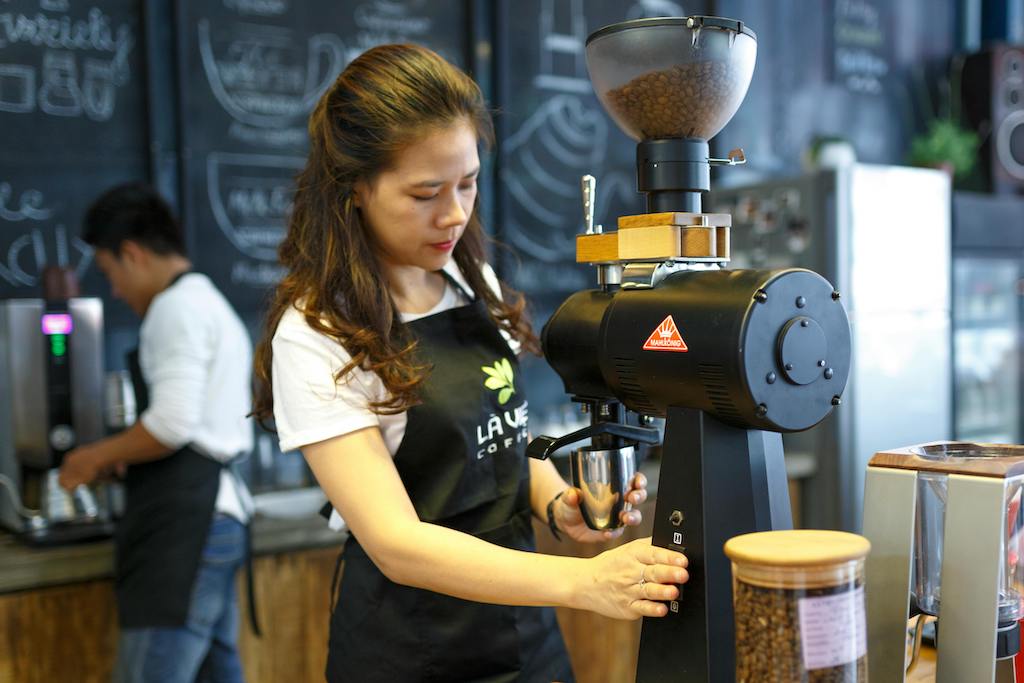
coffee shop business plan
Organizational structure and management.
"Roast & Revel Coffee Shop" operates with a well-defined organizational structure designed to streamline operations, foster community, and ensure the delivery of top-quality service and products. At the core of our organizational structure is a flat hierarchy intended to promote open communication and collaboration among all team members.
The structure begins with the Owner/CEO at the top, setting the strategic direction and overall objectives for the business. Reporting directly to the Owner/CEO are four key positions: the General Manager, Head Barista, Marketing Manager, and Operations Manager. This structure ensures that each critical area of the shop's operations receives focused oversight and expertise.
The General Manager, Emily Clark, holds the central role in day-to-day operations. Emily's extensive background in the coffee industry, coupled with her business administration education, positions her perfectly to oversee shop operations, staff management, and customer satisfaction. Emily reports directly to the Owner/CEO and is pivotal in translating the business's strategic vision into operational success.
Jordan Lee, our Head Barista, brings a wealth of experience and creativity to the team. With several regional barista competition wins under their belt, Jordan leads the barista team, ensuring the quality of each cup served and innovating new offerings. Their role is crucial in maintaining our commitment to high-quality, artisan coffee.
Alexa Kim, the Marketing Manager, specializes in food and beverage marketing and social media engagement. Alexa's role involves developing and implementing marketing strategies to build brand awareness, promote community events, and manage social media channels and local SEO efforts. Their expertise is essential in attracting and retaining our target market segments.
Charlie Morgan, our Operations Manager, oversees the logistical aspects of the shop, including inventory management, supplier relations, and sustainability practices. With a degree in Hospitality Management and experience in coffee shop operations, Charlie ensures the smooth running of day-to-day operations and adherence to our sustainability commitments.
Looking forward, our staffing needs will evolve as the business grows. Initially, we'll require a team of baristas to support Jordan in the coffee-making process, alongside customer service representatives to enhance the customer experience. As we expand, possibilities for roles in product development, additional marketing support, and financial management will arise, reflecting our commitment to innovation, community engagement, and operational excellence.
Our human resources policies and practices are designed to create a supportive, inclusive work environment. We prioritize continuous training and professional development, recognizing and rewarding exceptional performance, and fostering a culture of respect and teamwork. We're committed to fair hiring practices, competitive compensation, and benefits that reflect our appreciation for our team's hard work and dedication.
To ensure we're operating at the forefront of the coffee industry and business best practices, we engage external advisors and consultants in areas such as sustainability, coffee sourcing, and financial planning. These experts provide valuable insights that help us refine our strategies and operations, ensuring we remain competitive and continue to meet our customers' high expectations.
In conclusion, "Roast & Revel Coffee Shop" is built on a foundation of strong leadership, a skilled and dedicated team, and a commitment to excellence in every cup and customer interaction. Our organizational structure and management practices reflect our dedication to quality, innovation, and community, steering us toward a bright future in the vibrant heart of Portland's coffee scene.
coffee shop business plan pdf free download
"Roast & Revel Coffee Shop" proudly offers a curated selection of high-quality, artisan coffee blends alongside an array of specialty teas, freshly baked pastries, and light meals. Our coffee offerings, including unique blends such as "Morning Zen Blend" , "Dark Roast Delight" , and "Caramel Swirl Indulgence," are at the heart of our menu. These are complemented by specialty teas and our bakery section, featuring items like the "Revel Berry Scone" and "Chocolate Espresso Muffin" , along with wholesome light meals such as "Artisan Avocado Toast" and "Roast Veggie Panini" .
Our unique selling points and competitive advantages lie in our commitment to quality, the uniqueness of our blend formulations, and our community-centric approach. The "Morning Zen Blend" offers a calm start to the day with its smooth, balanced flavors, while the "Dark Roast Delight" caters to those seeking a more robust coffee experience. The "Caramel Swirl Indulgence" is a testament to our innovative approach, blending premium coffee with the rich flavors of caramel for a truly indulgent beverage. Our beverages are further enhanced by our bakery and light meal offerings, which are prepared in-house using locally sourced, high-quality ingredients, ensuring freshness and promoting community sustainability.
Currently, "Roast & Revel Coffee Shop" is operational and continuously developing our product range. Future plans include expanding our menu to introduce seasonal blends and limited-time offerings to cater to a broader audience and keep the customer experience dynamic and exciting. Additionally, we aim to introduce a line of merchandise, including branded reusable cups and coffee brewing equipment, catering to our customers' growing interest in sustainable coffee consumption practices.
In terms of intellectual property, we are in the process of registering trademarks for our coffee blend names and the "Roast & Revel" brand. Protecting our unique blend formulations and brand identity is crucial as we establish ourselves in the competitive coffee industry. We consider our blend recipes and roasting techniques proprietary knowledge, giving us a competitive edge in crafting distinctive coffee experiences for our patrons.
Our production process centers around quality and consistency. Coffee beans for our blends are sourced from trusted local and international sustainable farms, ensuring not only the quality of our product but also adherence to ethical sourcing practices. We work closely with suppliers like "Bean Origins" for international beans and "Local Roast Farms" for locally sourced beans. These relationships ensure a steady supply of premium beans that meet our strict quality standards. All our coffee is roasted on-site, allowing us to control the roasting process meticulously and adjust profiles to achieve the ideal flavor notes for each blend.
Bakery items and light meals are prepared daily in our kitchen, utilizing fresh ingredients supplied by local producers. Our operations manager oversees the supply chain, ensuring all ingredients adhere to our quality and sustainability criteria. This direct oversight of the production process allows us to maintain high standards across our entire product range.
In conclusion, "Roast & Revel Coffee Shop" offers a compelling array of products and services, centered on quality, community, and sustainability. Our unique blend offerings, paired with our commitment to local sourcing and ethical practices, position us as a distinctive player in Portland's coffee scene. Through continuous product development and a focus on protecting our intellectual property, we aim to solidify our standing and contribute positively to the community we serve.
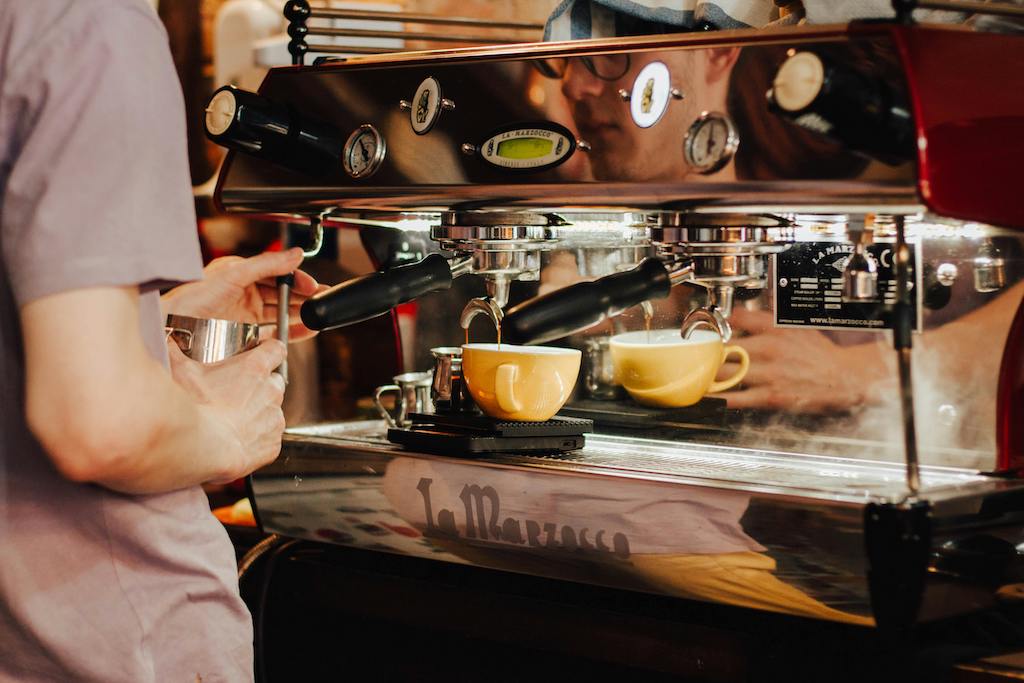
coffee shop business plan template
The marketing and sales strategy of "Roast & Revel Coffee Shop" is crafted to resonate with our target market of professionals aged 25-45, college students, and local residents in Portland, Oregon, who seek a premium coffee experience in a community-centric atmosphere. Our approach combines innovative marketing tactics, a customer-oriented sales strategy, competitive pricing, diverse distribution channels, and comprehensive promotion and advertising plans, all underpinned by our commitment to excellence in customer service.
Marketing Strategy: Our marketing strategy focuses on creating a strong brand presence both online and offline. Digitally, we will leverage social media platforms like Instagram, Facebook, and Twitter to engage with our audience through content that highlights our artisan coffee blends, specialty teas, freshly baked pastries, and light meals. We will also showcase our shop's cozy atmosphere, community events, and the sustainability practices that make us unique. Local SEO will be optimized to ensure "Roast & Revel Coffee Shop" appears prominently in local search results for coffee shops and cafes. Offline, we plan to participate in local community events and collaborate with nearby businesses to establish our brand within the community.
Sales Strategy: Our sales strategy emphasizes customer experience and retention. Staff, led by our Head Barista and informed by the General Manager, will be trained not only in coffee preparation but also in customer engagement and upselling techniques, aiming to transform each visit into a memorable experience. A loyalty program will be introduced to encourage repeat business, offering rewards such as discounts and exclusive access to monthly tasting events. Additionally, a subscription service for home delivery of our coffee blends will cater to those who wish to enjoy our products from the comfort of their homes.
Pricing Strategy: Pricing at "Roast & Revel Coffee Shop" is based on a value-based approach. Our prices will reflect the high quality of our offerings and the premium experience we provide while remaining competitive within the Portland coffee shop market. We aim to offer products at various price points to cater to a broad audience, from premium artisan coffees to more affordable daily delights, ensuring there is something for everyone.
Distribution Channels: Our primary sales channel will be our physical location in Portland, designed to provide a welcoming and engaging environment for customers. To extend our reach, we will also enable online ordering through our website for both pickup and local delivery. Plans for future expansion include exploring partnerships with online food delivery platforms to increase accessibility and convenience.
Promotion and Advertising Plans: Promotion and advertising efforts will focus on building brand awareness and driving foot traffic to the shop. We will deploy targeted social media ad campaigns and engage in email marketing to keep our subscribers informed about promotions, new arrivals, and upcoming events. Local press releases and participation in community events will also serve as opportunities to garner attention and attract new customers.
Customer Service Policies: Exceptional customer service is paramount at "Roast & Revel Coffee Shop" . Our policies are designed to ensure customer satisfaction, including a friendly and knowledgeable staff, a welcoming atmosphere, and prompt resolution of any issues. Feedback will be actively solicited through in-store and online channels, and used to continually refine our offerings and service. A return and refund policy for our subscription service and merchandise will be clearly communicated to ensure transparency and build trust.
Through this comprehensive marketing and sales strategy, "Roast & Revel Coffee Shop" aims to not only attract but also retain a loyal customer base, establishing itself as a staple of the Portland coffee scene and a beloved community hub.
starting a coffee shop business plan pdf
The Operations Plan for "Roast & Revel Coffee Shop" outlines the foundational processes and strategies designed to ensure smooth daily operations, high-quality product delivery, efficient inventory management, and sustainable supply chain practices. This plan also details our facilities and equipment needs, cementing our commitment to providing a premium coffee experience in Portland, Oregon.
Operational Workflow:
Each day at "Roast & Revel" , operations commence with an early morning preparation session, where our team, led by the Head Barista, inspects, cleans, and primes all coffee machines and kitchen equipment. Fresh ingredients for our baked goods and light meals are received and inspected for quality. Our baristas then begin the coffee brewing process, emphasizing precision and consistency. Throughout the day, staff members rotate between brewing, serving customers, and managing the seating area to ensure a clean and welcoming environment. Closing procedures include thorough cleaning, restocking for the next day, and a brief team meeting to discuss the day's experiences and any customer feedback.
Production or Service Delivery Processes:
Our coffee is sourced from a meticulously curated selection of local and international sustainable farms. Upon arrival, beans are stored in a climate-controlled environment to maintain freshness. Roasting is conducted in-house, allowing us to adjust the profiles to achieve the desired flavor notes. Beverages are made to order, and pastries and meals are prepared daily, adhering to strict quality and safety standards. The service delivery process is streamlined to minimize wait times, with baristas trained in efficient preparation techniques and customer service.
Quality Control Measures:
Quality control at "Roast & Revel" is multilayered, involving regular checks at each production stage—from sourcing and storage to preparation and service. Beans are inspected and sampled upon delivery. We conduct daily calibration of equipment to ensure consistency in beverage preparation. Our Head Barista oversees a regular tasting program to maintain the highest beverage quality and train staff in flavor profile recognition. Customer feedback is actively sought and reviewed to identify any areas for improvement.
Inventory Management:
A robust inventory management system tracks stock levels of coffee beans, ingredients for food items, and other supplies. This system alerts the Operations Manager when stock reaches reordering thresholds, ensuring we never run low on essential items. We employ a first-in, first-out (FIFO) approach to use ingredients efficiently and reduce waste. Monthly inventory audits are conducted to identify trends and adjust stocking levels as necessary.
Supply Chain Management:
Our supply chain is managed with a focus on sustainability and ethical practices. We have developed strong relationships with a network of local and international suppliers who share our values. Regular evaluations ensure these suppliers continue to meet our standards for quality, reliability, and sustainability. Contracts are negotiated to secure competitive pricing while maintaining the flexibility to explore new products and innovations.
Facilities and Equipment Needs:
"Roast & Revel" operates from a centrally located premises in Portland, thoughtfully designed to create a cozy and inviting atmosphere. The facility is equipped with high-quality espresso machines, coffee grinders, baking ovens, refrigeration units, and other kitchen equipment necessary to deliver our product offerings efficiently. To support our in-house roasting process, we have invested in a state-of-the-art roasting machine. Regular maintenance schedules are enforced to ensure all equipment is in optimal working condition, supporting the elegance and efficiency of our operations.
In conclusion, the Operations Plan for "Roast & Revel Coffee Shop" is structured to ensure operational excellence, product quality, and customer satisfaction. Through meticulous planning and dedication to our core values, we aim to solidify our place as a pillar of the Portland coffee community.

cafe business plan pdf
The Financial Projections section of the "Roast & Revel Coffee Shop" business plan meticulously articulates our financial expectations over the next 3-5 years. By offering a detailed examination, including sales forecasts, profit and loss projections, cash flow estimates, balance sheet forecasts, and a break-even analysis, we provide a comprehensive outlook of our financial trajectory. Embedded within these projections are the financial assumptions and considerations that underpin our strategic decisions, tailored to navigate the vibrant and competitive landscape of Portland's coffee scene.
Sales Forecast:
Over the initial three years, "Roast & Revel" anticipates a consistent growth trajectory in sales revenue. Year one aims for $250,000, reflecting the establishment phase and brand penetration efforts. With strategic marketing and community engagement, year two targets a 32% increase, aiming for $330,000. By year three, incorporating expanded offerings and enhanced brand recognition, we project sales to climb to $410,000. These estimates are grounded in moderate growth assumptions, considering consumer behavior trends and competitive dynamics in Portland's coffee industry.
Profit and Loss Projection:
Our profit and loss projections align with our sales forecast, anticipating gradual growth in net profit margins from 10% in year one to 15% by year three. Initially, investments in branding, equipment, and facility setup will moderate net profits; however, efficiencies gained from operation scaling and customer base expansion will drive margin improvements. Operational expenses, including rent, utilities, payroll, and supplies, are carefully budgeted to ensure fiscal discipline while maintaining the premium quality and experience "Roast & Revel" is committed to delivering.
Cash Flow Projection:
Cash flow projections indicate a positive cash flow starting in the latter half of year one, as initial investments in setup and inventory are offset by incoming revenue streams. Proactive management of operating costs and strategic reinvestment of profits are planned to facilitate healthy cash flow, supporting both operational needs and future growth initiatives. Cash reserves will be maintained to hedge against unforeseen circumstances, ensuring business continuity even amidst market volatility.
Balance Sheet Projection:
The balance sheet for "Roast & Revel Coffee Shop" is expected to strengthen over the forecast period, with assets increasing as the business establishes its presence and builds equity. Liabilities, primarily comprising initial startup loans, are scheduled for repayment within the first three years, improving our equity position. Investments in equipment and facility improvements are capitalized, reflecting our commitment to long-term asset value.
Break-even Analysis:
Our break-even analysis reveals that "Roast & Revel" will reach the break-even point towards the end of year one. This calculation is based on fixed costs (rent, utilities, salaries) and variable costs (supplies, ingredients, marketing), set against projected sales revenue. Achieving this milestone within the first year underscores the viability of our business model and operational efficiency.
Financial Assumptions and Considerations:
The financial projections are built on a set of conservative assumptions: a steady growth in the coffee consumption trend, successful market penetration and brand loyalty build-up, and moderate economic conditions affecting discretionary spending. Additionally, we account for factors such as potential supply chain disruptions and price fluctuations in coffee beans. Considerations for future planning include exploring financing options for expansion, reinvestment in marketing strategies, and ongoing evaluation of product line profitability to adjust our offerings in response to market demands.
In conclusion, the financial projections for "Roast & Revel Coffee Shop" are not only a testament to our foresighted planning but also reflect a realistic and achievable roadmap. By anchoring our strategy in prudent financial management, quality focus, and community engagement, we are poised for sustainable growth and profitability in the dynamic Portland coffee shop market.
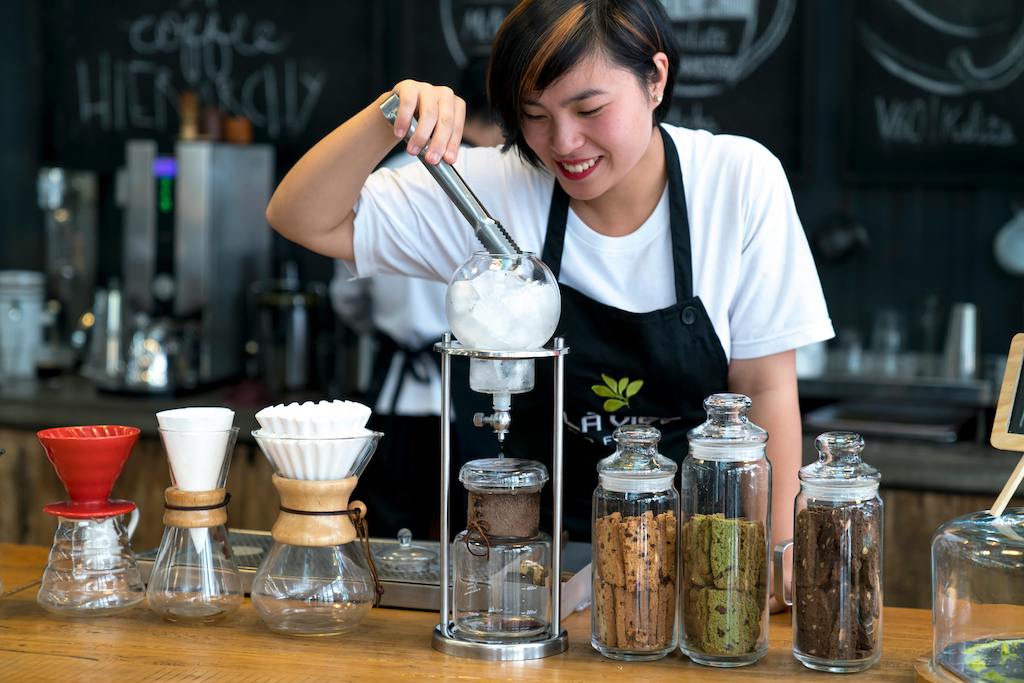
coffee shop business plan example
The success of "Roast & Revel Coffee Shop" in Portland's competitive market hinges not just on executing a well-thought-out business plan but also on our ability to anticipate, mitigate, and navigate potential risks. This Risk Analysis section delineates various risks that could impact our operations, financial health, and market position, alongside strategies to mitigate these risks and suitable contingency plans.
Market Risks:
One key market risk is the evolving consumer preferences towards coffee consumption. As trends fluctuate, so does the risk of our offerings becoming less appealing. Additionally, the competitive landscape poses a substantial risk, with new and existing players vying for market share.
- Mitigation Strategies: To counteract these risks, "Roast & Revel" plans to regularly engage with our customer base through feedback mechanisms and market research to stay ahead of trends. Diversifying our product offerings to include a wide range of options that cater to various customer preferences will also be vital. - Contingency Plan: Should market shifts significantly impact our core offerings, we are prepared to rapidly innovate our menu, introducing new products that align with emerging trends.
Operational Risks:
Operational challenges, including supply chain disruptions, staffing issues, and equipment malfunctions, can severely affect our day-to-day operations and, by extension, our revenue.
- Mitigation Strategies: Establishing relationships with multiple suppliers will guard against supply chain disruptions, while a structured training program ensures a pool of competent staff to mitigate dependency on any single employee. Regular maintenance schedules for equipment will help prevent unexpected breakdowns. - Contingency Plan: In the event of severe operational disruptions, our plan includes a financial buffer to cover short-term costs and agreements with local businesses for temporary supply arrangements.
Financial Risks:
Financial stability can be threatened by fluctuating operational costs, unexpected expenditures, and shifts in consumer spending due to economic downturns.
- Mitigation Strategies: Prudent financial management, including conservative budgeting and rigorous monitoring of expenditures, will be foundational. Additionally, building a diverse revenue stream, including subscriptions and online sales, can provide financial stability amidst fluctuations in in-store sales. - Contingency Plan: Access to a line of credit will serve as a financial cushion to manage cash flow challenges, and flexible pricing strategies can be employed to adjust to economic pressures affecting consumer spending.
Insurance and Legal Considerations:
Unforeseen events such as accidents on the premises, legal disputes, or natural disasters represent risks that could have significant legal and financial repercussions.
- Mitigation Strategies: Comprehensive insurance coverage, including general liability, property, and workers' compensation insurance, will form a protective layer against many of these risks. Regular legal audits and compliance checks will ensure adherence to industry regulations and local laws. - Contingency Plan: In case of significant legal or insurance claims, a specialized legal fund will be set aside, and relationships with legal counsel will be established to ensure efficient response to legal challenges.
In conclusion, while "Roast & Revel Coffee Shop" faces a range of potential risks across market, operational, and financial domains, our proactive approach in identifying these risks and implementing strategies to mitigate them positions us well to navigate uncertainties. Our contingency plans, alongside insurance and legal considerations, underscore our commitment to ensuring the long-term sustainability and success of our venture in Portland's vibrant coffee scene.

cafe business plan
More business plan templates.

Real estate development business plan
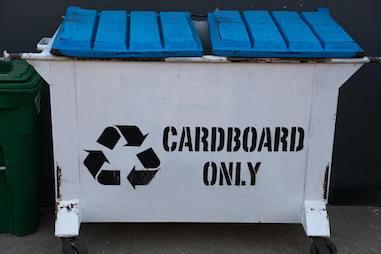
Junk removal business plan

Family entertainment center business plan
Coffee Shop Business Plan Ultimate Guide + Free Example

July 6, 2023
Adam Hoeksema
When it comes to starting a coffee shop, writing a business plan may not be your top priority. You're probably eager to dive into the exciting world of brewing aromatic coffee and serving delicious treats, rather than spending days crafting a detailed plan.
However, it's important to understand that potential lenders and investors often require a business plan before they consider supporting your venture. So, while it may not be your first choice, having a well-prepared business plan with realistic financial projections is crucial to securing the financial backing you need.
So if you have to do it, this article is going to help you walk through the following:
- What Should be Included in a Coffee Shop Business Plan?
Coffee Shop Business Plan Outline
- Conducting Market Research for Your Coffee Shop Business Plan
- Creating Financial Projections for Your Coffee Shop Business Plan
Example Coffee Shop Business Plan
- Free Coffee Shop Business Plan Template Download
- Coffee Shop Business Plan FAQs
With that in mind as the path forward, let’s dive in.
A coffee shop business plan should effectively convey to investors and lenders why customers would prefer to frequent your coffee shop, why you or your team are the ideal individuals to manage the coffee shop, and how the financial projections are structured to ensure a worthwhile return on their investment. Below is a comprehensive layout of our complimentary coffee shop business plan template.
I. Executive Summary
Ii. market analysis, iii. business concept, iv. marketing strategy, v. operations plan, vi. financial plan, startup costs and use of funds, annual sales, gross profit and net profit, key financial ratios, financial summary, income statement annual summary, cash flow statement annual summary, balance sheet annual summary, vii. management team.
VII. Conclusion
How to do Market Research for a Coffee Shop Business Plan
Central to any coffee shop business plan is market research. You need to comprehend your position in the market and aim to validate that there is ample demand for your specific coffee shop concept, location, and pricing structure. You can explore more about our coffee shop market researc h approach here, but ultimately, you aim to understand your competition, gain insights into potential customer footfall, select an optimal location, and anticipate any seasonal trends that might influence your business. Here are some instruments and strategies for conducting market research for your proposed coffee shop.
What Will be the Cost to Advertise my Coffee Shop?
We recommend using Google Keyword Planner to assist you in determining which keywords to advertise for attracting customers to your coffee shop's website. The tool also provides an estimate of how much each click will cost when advertising for various keywords, as seen below:

What Keywords are Customers Using in Their Searches?
We utilize both Google Keyword Planner and Ahrefs to discover which keywords are channeling traffic to your competitors' websites. For instance, you can run a report on a competitor's website to see the keywords they rank for and the amount of organic traffic each keyword brings. This information can help streamline your SEO efforts.

How Seasonal are Coffee Shops?
We use Google Trends to identify how seasonal your coffee shop concept might be. As an example, you can see below that the search volume for “coffee shop near me” in the United States is somewhat seasonal in nature. January is consistently the low point, with the summer and fall tending to be the high point of the season.


How Many Customers Do my Competitors Receive Each Month?
Lastly, we find it beneficial to generate foot traffic reports on your competitors to ascertain the typical number of customers they receive at their coffee shops. You can see an example below that indicates the number of visits per month for a specific location:

In the end, the potential customer base for your coffee shop will be a critical assumption that will form the backbone of your financial projections. Therefore, understanding the footfall of your competitors can aid you in estimating potential traffic to your coffee shop.
How to Create Financial Projections for a Coffee Shop Business Plan
Once you've conducted thorough market research, it's time to develop financial projections for your coffee shop. Our coffee shop financial projection template is designed to help you estimate revenue based on customer traffic, taking into account factors such as seating capacity and the efficiency of your kitchen operations. These projections serve two important purposes: demonstrating your ability to repay a loan and showcasing the potential return on investment for potential investors. To achieve this, consider the following steps:
- Estimate startup costs for your coffee shop
- Forecast revenue
- Project food and labor cost
- Estimate your operating expenses like rent and utilities
- Calculate how much investor or loan capital you will need to open
Our coffee shop projection template offers guidance in this process and provide a standardized format that meets the requirements of investors and lenders. Typically, a comprehensive set of projections for a startup coffee shop should include an integrated income statement, balance sheet, and cash flow forecast.
Remember, while writing a business plan and developing financial projections may seem daunting, they are essential steps in securing the necessary funding and creating a roadmap for your coffee shop's success. By following these guidelines and utilizing our templates, you'll be well-equipped to present a compelling case to potential investors and lenders.
Below is the content of our example coffee shop business plan. You can also access a Google Doc version of this coffee shop business plan template here , allowing you to personalize it to suit your needs. In addition, you can follow along with this video walkthrough designed to assist you in adapting the business plan to your specific coffee shop concept.
Coffee Shop Business Plan Template
Brewtopia is a specialty coffee shop located in the heart of downtown, offering customers a unique and elevated coffee experience. Our target market is young professionals and coffee connoisseurs who are looking for high-quality coffee and a comfortable, chic atmosphere. Our goal is to differentiate ourselves from other coffee shops in the area by offering a unique selection of specialty coffee drinks and a curated menu of pastries and small bites, made with locally-sourced ingredients. In addition to traditional espresso-based drinks, Brewtopia will offer Nitro cold brew on tap and a variety of flavored lattes made with natural syrups. With a focus on quality, customer service, and community involvement, Brewtopia aims to become a staple in the downtown community and to provide customers with a memorable coffee experience.
The coffee industry is a rapidly growing market, with revenue in the US estimated at $48 billion in 2021. Within the industry, the specialty coffee segment is growing even faster as consumers are willing to pay more for a premium experience.
Our target market is young professionals, ages 25-40, who value convenience and quality in their coffee choices. The downtown area, where Brewtopia will be located, has several coffee shops, but none offer the same level of specialty drinks and baked goods that we will offer. With a focus on quality and a unique experience, Brewtopia is well-positioned to capture a significant share of the growing specialty coffee market in the downtown area.
Brewtopia's concept centers around providing customers with a unique and elevated coffee experience.
Our menu will include a variety of specialty coffee drinks made with high-quality, responsibly-sourced beans, as well as a curated selection of pastries and small bites made fresh daily using locally-sourced ingredients. In addition to traditional espresso-based drinks, Brewtopia will offer Nitro cold brew on tap and a variety of flavored lattes made with natural syrups, differentiating ourselves from other coffee shops in the area. Our chic and modern decor will provide a comfortable and inviting atmosphere for customers to work, relax, and socialize.
Brewtopia's marketing strategy will focus on building brand awareness and attracting customers through a strong presence on social media, targeted advertising, and community involvement. We will maintain a strong presence on platforms like Instagram and Facebook, showcasing our products and connecting with customers.
Our targeted advertising will focus on reaching young professionals in the downtown area through channels such as local publications and online ads. In addition, Brewtopia will be active in the community, hosting events and supporting local organizations, helping us to build relationships with our customers and establish ourselves as a part of the downtown community.
We will also offer loyalty programs and special promotions to encourage repeat business. Our pricing strategy will be competitive with other specialty coffee shops in the area, but slightly higher to reflect the premium quality of our products.
Brewtopia will be open 7 days a week, from 7am to 7pm. Our team of baristas will be trained to provide exceptional customer service and to prepare a wide range of specialty coffee drinks. We will use a point-of-sale system to manage orders and track inventory, and all baked goods will be prepared fresh daily on-site.
Brewtopia will occupy a 1,500 square foot space in the downtown area, which will include a kitchen for preparing food, a bar for coffee preparation, and seating for 20-25 customers. The space will be designed to be modern and chic, creating a welcoming atmosphere for customers.
The start-up costs for Brewtopia are estimated at $200,000, which includes the costs of leasing a space, equipment and supplies, marketing and advertising, and initial inventory. We plan to finance the startup costs through a combination of personal savings, a small business loan, and investments from friends and family.
All of the unique financial projections you see here were generated using ProjectionHub’s coffee shop financial projection template . Use PH20BP to enjoy a 20% discount on the template.

Watch how to create financial projections for your very own coffee shop:

Brewtopia will be owned and operated by Jane Doe, a seasoned coffee professional with over 10 years of experience in the coffee industry. Jane will manage the daily operations of the business and provide exceptional customer service, while also training and supervising a team of baristas. Additionally, Jane will be responsible for the financial management of the business and the development of our marketing strategy.
VII. Conclusion
Brewtopia is poised to fill a gap in the specialty coffee market in the downtown area. With a focus on quality, customer service, and community involvement, we aim to become a staple in the downtown community and provide customers with a memorable coffee experience. With a solid financial plan and a seasoned management team, Brewtopia is well-positioned for success in the growing specialty coffee market.
Coffee Shop Business Plan FAQs
What are the essential elements to include in a coffee shop business plan.
A coffee shop business plan should include sections on executive summary, company description, market analysis, target audience, menu and pricing, marketing and promotional strategies, location and facilities, staffing and management, and financial projections.
How can I determine the ideal location for my coffee shop?
When selecting a location for your coffee shop, consider factors such as foot traffic, proximity to offices or residential areas, competition in the area, parking availability, and visibility. A bustling area with a high concentration of your target customers can be an ideal location.
How can I estimate the financial projections for my coffee shop?
Financial projections for a coffee shop should include estimates for start-up costs, monthly expenses (such as rent, utilities, ingredients, and employee salaries), projected sales revenue based on customer traffic and average spending, and a break-even analysis to determine when your coffee shop will become profitable.
About the Author
Adam is the Co-founder of ProjectionHub which helps entrepreneurs create financial projections for potential investors, lenders and internal business planning. Since 2012, over 50,000 entrepreneurs from around the world have used ProjectionHub to help create financial projections.
Other Stories to Check out
2 ways to buy a business with 100% seller financing.
Can you secure 100% seller financing when buying a business? This explanation explores the rare circumstances under which sellers might offer full financing
Why Does the SBA Want to Take my Home as Collateral?
Why does the SBA require your home as collateral for loans? This guide explains how business assets are valued and why home equity is often needed to secure SBA loans, ensuring lender protection and loan feasibility.
What if I Sell my Home that is Pledged as Collateral on an SBA Loan?
What happens if you sell your home that's used as collateral for an SBA loan? Learn the steps to coordinate with your lender and explore your options to ensure a smooth sale and compliance with loan terms.
Have some questions? Let us know and we'll be in touch.
Coffee Shop Business Plan Template & PDF Example
- September 4, 2024
- Food & Beverage
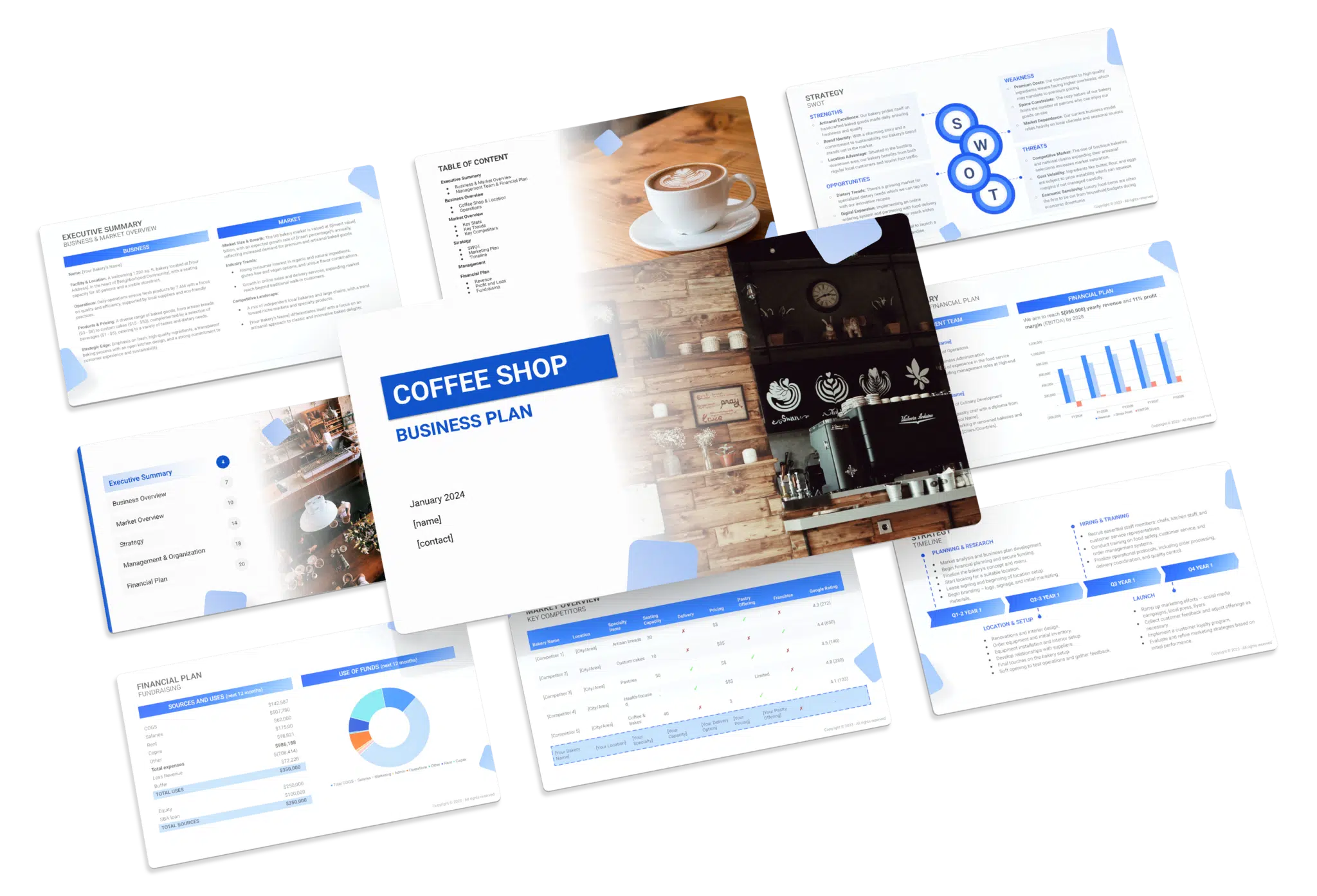
Creating a comprehensive business plan is crucial for launching and running a successful coffee shop. This plan serves as your roadmap, detailing your vision, operational strategies, and financial plan. It helps establish your coffee shop’s identity, navigate the competitive market, and secure funding for growth.
This article not only breaks down the critical components of a coffee shop business plan, but also provides an example of a business plan to help you craft your own.
Whether you’re an experienced entrepreneur or new to the food and beverage industry, this guide, complete with a business plan example, lays the groundwork for turning your coffee shop concept into reality. Let’s dive in!
Our coffee shop business plan is structured to cover all essential aspects needed for a comprehensive strategy. It outlines the shop’s operations, marketing strategy, market environment, competitors, management team, and financial forecasts.
- Executive Summary : Offers a quick look at your coffee shop idea, market research , your team, and money plans.
- Coffee Shop & Location: Talks about the design, special features, and why the spot is great for customers.
- Operations: Describes how your shop runs daily, like hours, staff roles, and your menu items with prices.
- Key Stats: Gives numbers on how big the coffee shop world is and what’s trending.
- Key Trends : Points out new things in coffee shops, like eco-friendly practices or tech for ordering.
- Key Competitors: Looks at other coffee places nearby and how your shop is different.
- SWOT: Lists strengths, weaknesses, opportunities, and risks for your shop.
- Marketing Plan : Ideas for getting the word out and keeping customers coming back.
- Timeline : Major steps and goals from starting up to the first year.
- Management: Highlights Info on your leading team and their roles.
- Financial Plan : Predicts financials for 5 years, like how much you’ll make, spend, and keep as profit.
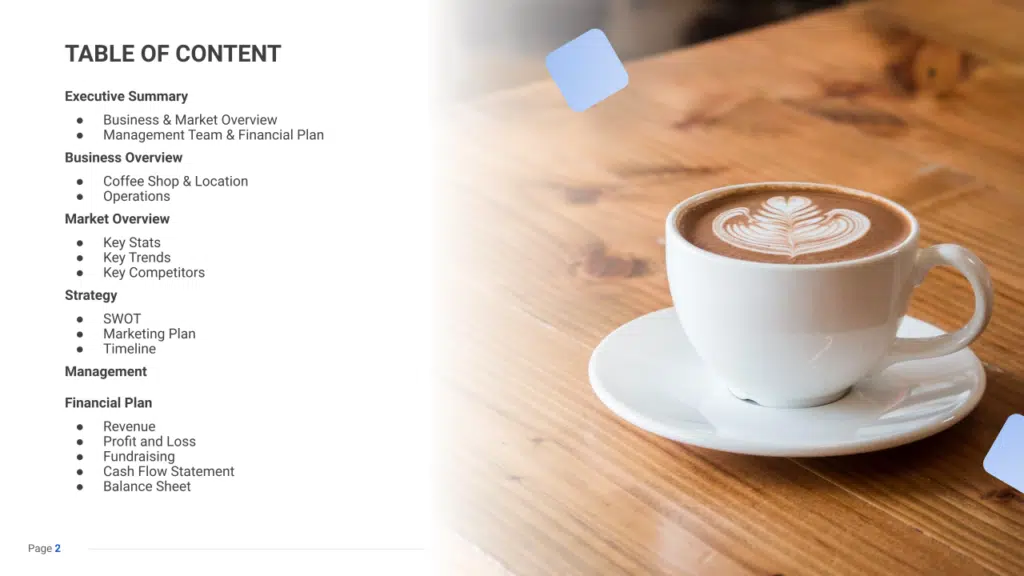
Coffee Shop Business Plan Template (Download)

Fully editable 30+ slides Powerpoint presentation business plan template.
Download an expert-built 30+ slides Powerpoint business plan template
Executive Summary
The Executive Summary presents a concise overview of your coffee shop’s business plan, encapsulating the essence of your establishment and its offerings. It should articulate your market positioning, the variety of coffee and related products you offer, its location, size, and a brief on the daily operations.
This section should also delve into how your coffee shop will carve its niche within the local community, including an analysis of the number of direct competitors in the vicinity, identifying who they are, as well as highlighting your coffee shop’s unique selling points that set it apart from these competitors.
Moreover, information about the management and co-founding team should be included, elaborating on their roles and the value they bring to the coffee shop’s success. Additionally, a synopsis of your financial projections, including anticipated revenue and profits over the next five years, should be provided here to offer a clear view of your coffee shop’s financial strategy.
Coffee Shop Business Plan Executive Summary Example
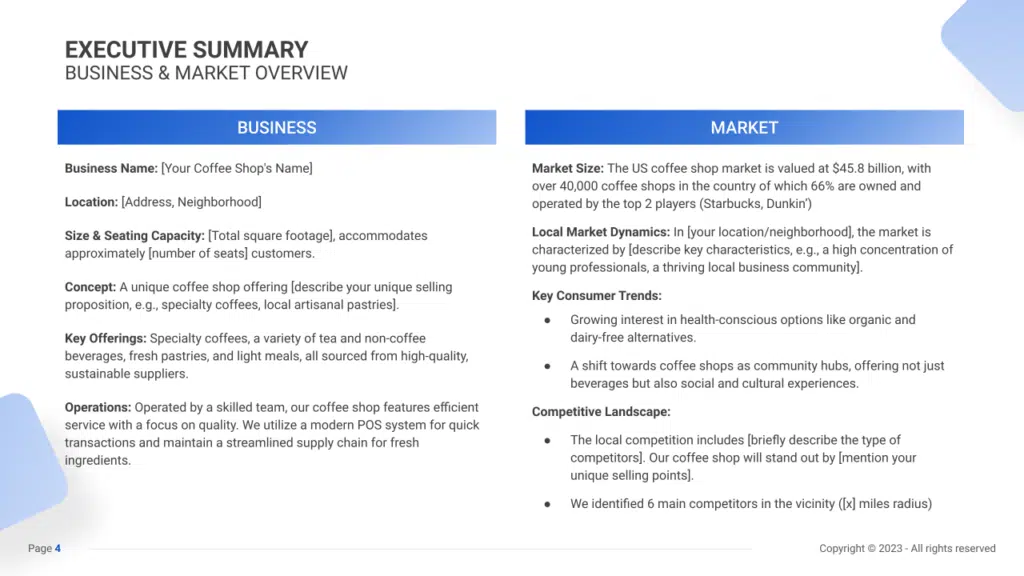
Business Overview
The business overview section should detail the coffee shop’s specific features, including its size, seating capacity, and concept. This is where you explain what makes your coffee shop unique, such as its focus on specialty coffees and local artisanal pastries, and how it operates.
Example: “Bean Haven,” located in the bustling Midtown area, spans 2,000 square feet and can seat 40 customers. It stands out with its range of gourmet coffees and fresh pastries, all sourced from local suppliers. The shop’s modern POS system ensures efficient service, enhancing the overall customer experience.
Market Overview
In this section, analyze the local and national coffee shop market. Discuss the size of the market, growth trends, and consumer preferences. This analysis should position your coffee shop within the broader industry context and highlight its potential to meet current consumer demands.
Example: Bean Haven enters a U.S. coffee shop market valued at $45.8 billion. In its neighborhood, known for a dense population of young professionals, Bean Haven’s focus on health-conscious options and its role as a community hub align with shifting consumer preferences, setting it apart from six main competitors in the area.
Management Team
This section outlines the experience and roles of your management team. Detail how their background and skills contribute to the success of the coffee shop.
Example: Bean Haven is led by a CEO with 10 years of experience in café management, overseeing daily operations and supply chain efficiency. The CFO, with a background in hospitality sector marketing, handles the shop’s financial strategies and marketing campaigns, ensuring robust business operations.
Financial Plan
Here, present your financial goals and projections. Include revenue targets and profit margins, providing a clear picture of your coffee shop’s financial aspirations and health.
Example: Bean Haven aims for $830,000 in annual revenue with an 11% EBITDA margin by 2028. This goal is supported by a focused approach on high-quality offerings, strategic marketing, and community engagement, positioning Bean Haven for success in the competitive market.
For a Coffee Shop, the Business Overview section can be neatly divided into 2 main slides:
Coffee Shop & Location
Talk about your coffee shop’s look and feel, highlighting cozy seats and nice lighting that make it welcoming. Mention its location, noting how easy it is to get there, like being close to shops or having easy parking. Explain why this spot is great for attracting customers.
Operations & Offerings
List the kinds of coffee and other items you sell, including snacks or light food. Discuss pricing, making sure it matches the quality of what you’re selling and suits your target customers . Share special features of your shop, such as using local products or offering unique coffee flavors. Mention any deals or events you have to keep customers coming back.
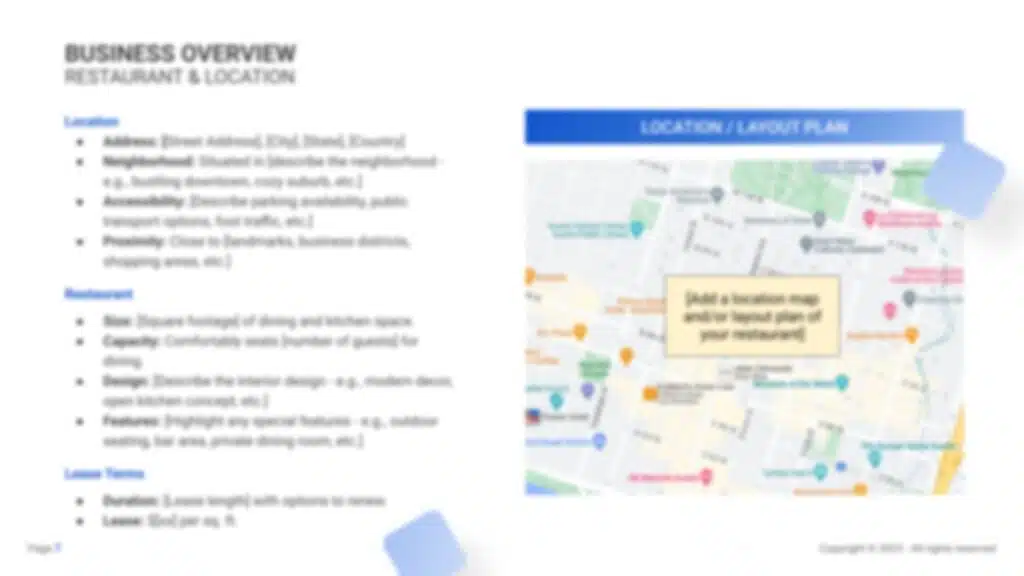
Industry Size & Growth
In the Market Overview of your coffee shop business plan, begin by exploring the size of the coffee industry and its potential for growth. This analysis is key to understanding the breadth of the market and pinpointing opportunities for expansion.
Key Market Trends
Next, discuss current trends in the coffee market, like the growing demand for specialty coffee, the appeal of ethically sourced and organic beans, and the innovation in coffee brewing techniques. Highlight the interest in offerings that cater to diverse preferences and dietary needs, such as plant-based milk options and artisanal blends, as well as the increasing importance of sustainability in the coffee industry.
Competitive Landscape
A competitive analysis is not just a tool for gauging the position of your coffee shop in the market; it’s also a fundamental component of your business plan.
This analysis helps identify your coffee shop’s unique selling points, which are essential for differentiating your business in a competitive market.
In addition, competitive analysis is integral in laying a solid foundation for your business plan. By examining various operational aspects of your competitors, you gain valuable information that ensures your business plan is robust, informed, and tailored to succeed in the current market environment.
Identifying Your Coffee Shop’s Competitors
The first step in conducting a competitive analysis for your coffee shop is identifying your direct and indirect competitors. Direct competitors include nearby coffeehouses or chains that offer similar services and products, while indirect competitors might encompass local juice bars, tea houses, or even convenience stores selling coffee.
Utilize tools like Google Maps to map out competitor locations and understand their distribution across your area. Online platforms like Yelp, Google Reviews, or social media channels provide invaluable insights into customer reviews and ratings, shedding light on competitor strengths and weaknesses . For instance, if a rival coffee shop receives praise for its artisanal coffee blends and cozy ambiance, it signifies a notable strength.
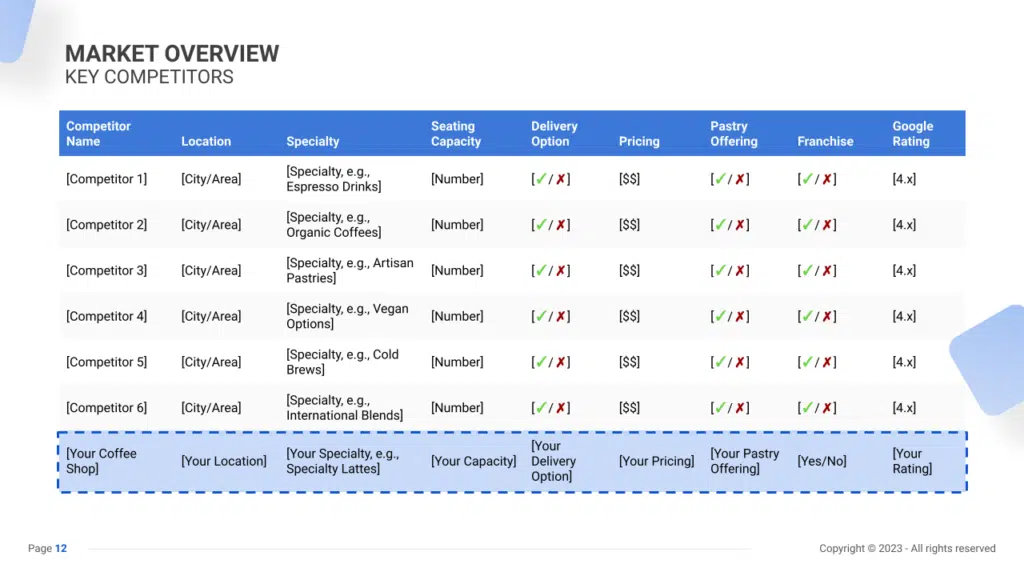
Coffee Shop Competitors’ Strategies
To gain a deeper understanding of the competitive landscape, analyze various facets of your competitors’ strategies:
- Coffee Menu Offerings: Assess the range and uniqueness of coffee offerings. For instance, if a local competitor, “Brew Masters,” is gaining traction with exotic single-origin coffees or specialty cold brews, it highlights a potential trend or gap in the market for distinctive coffee blends.
- Service and Ambiance: Consider the ambiance and customer service. Perhaps a competitor, “Sip & Chill Café,” is known for its relaxed atmosphere and friendly staff, enhancing the overall customer experience.
- Pricing Strategy : Compare your pricing with competitors. Are your coffee prices aligned with those of other local cafes, or do you position yourself as a premium establishment akin to “Gourmet Grinds,” offering artisanal blends at a higher price point?
- Marketing and Branding: Analyze how competitors market their brand. Do they rely heavily on social media campaigns, influencer collaborations, or community events? Understanding their marketing tactics can help refine your promotional strategies.
- Innovative Offerings and Technology: Look for innovative approaches. Are competitors embracing technology for online ordering or loyalty programs? For example, “TechBeans Café” might leverage an efficient app-based ordering system, catering to tech-savvy customers.
What’s Your Coffee Shop’s Value Proposition?
Defining your coffee shop’s unique value proposition is critical. Perhaps your establishment specializes in single-origin, ethically sourced beans, or you have a signature blend that customers rave about. Emphasize these unique offerings to distinguish your brand in the market.
Consider market gaps and evolving customer preferences. If there’s a growing preference for sustainable practices or an increasing demand for specific coffee types (organic, fair trade, etc.), tailoring your offerings to meet these needs can position your coffee shop favorably amidst competitors.
Tailoring your offerings to your location is essential. A coffee shop in a bustling business district might emphasize quick service and convenience for professionals on the go. At the same time, a suburban café could focus on creating a warm, family-friendly environment to attract locals seeking a relaxing spot for gatherings or leisurely coffee breaks.
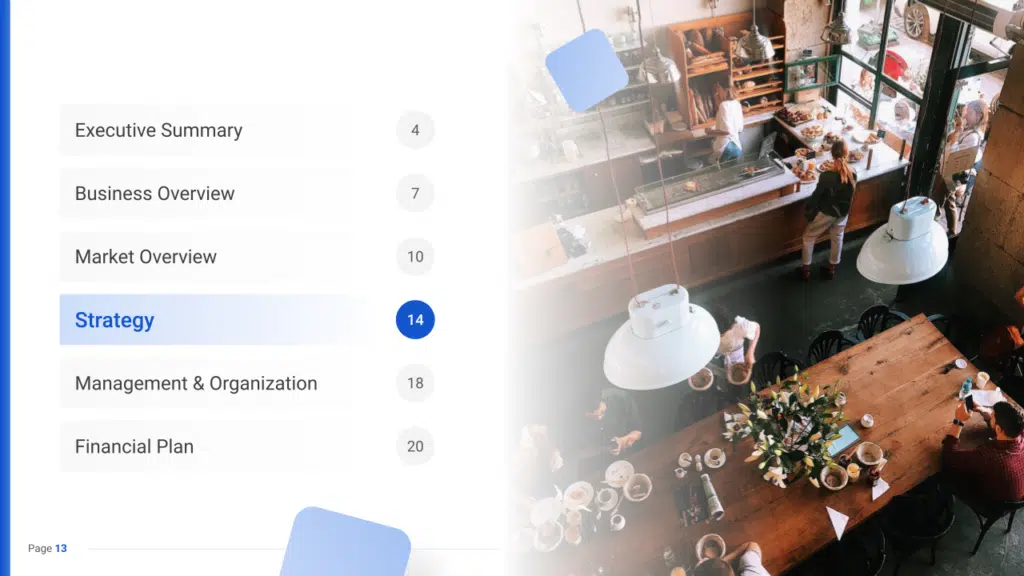
Start by doing a SWOT analysis for the coffee shop. Point out Strengths (like skilled baristas and a variety of coffee options), Weaknesses (such as high running costs or lots of competitors), Opportunities (for instance, more people wanting unique coffee experiences), and Threats (like economic changes that might reduce how much people spend on coffee).
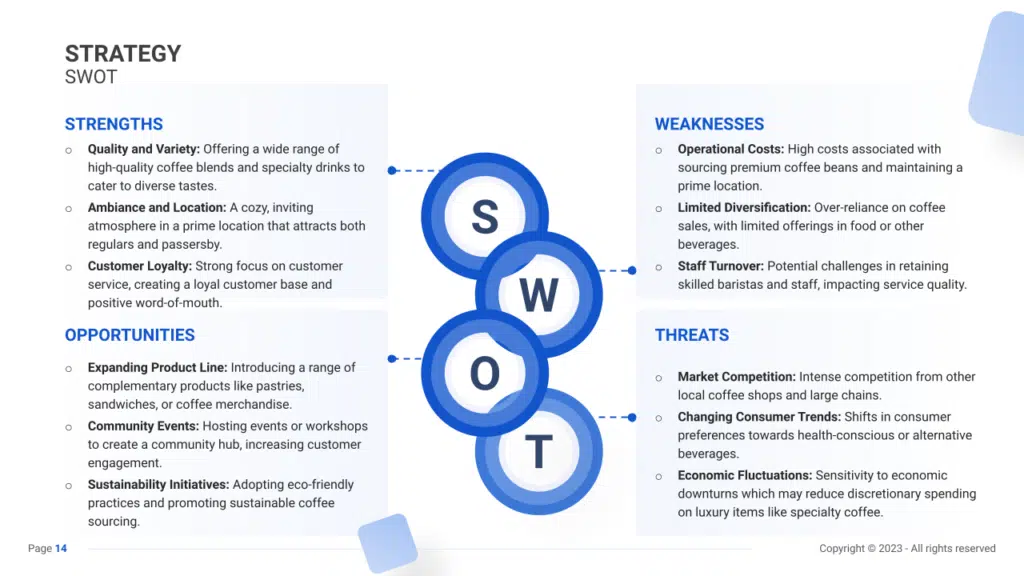
Marketing Plan
Then, make a marketing plan that shows how to draw in and keep customers. This could include ads aimed at the right people, deals to save money, an active and interesting online presence, and getting involved in the local area.
Marketing Channels
Utilize various marketing channels to reach and engage your audience effectively.
Digital Marketing
- Establish a Strong Online Presence: Leverage social media platforms like Instagram for visually appealing coffee shots, TikTok for engaging short videos, and Twitter/Facebook for engaging with customers and sharing updates.
- Email Marketing: Build an email list and send newsletters featuring new coffee blends, upcoming events, or promotions. Offer incentives for signing up, such as a discount on the first purchase.
- Website and SEO: Develop a user-friendly website showcasing your menu, the story behind each coffee blend, and a blog section for brewing tips or coffee-related content. Optimize for local SEO to attract nearby customers.
Local Advertising
Connect with the local community to increase foot traffic:
- Flyers and Local Print: Distribute eye-catching flyers in nearby offices, community centers, and partner businesses. Advertise in local newspapers or magazines to reach a broader audience.
- Community Engagement: Host events like cupping sessions, live music nights, or art exhibitions to create a gathering space. Partner with local artists, musicians, or charities to foster community connections.
- Partnerships: C ollaborate with neighboring businesses, such as bakeries, bookstores, or gyms, for cross-promotions or joint events.
Promotional Activities
Attract customers with enticing offers and loyalty programs:
- Special Deals: Launch seasonal or themed promotions to attract customers. For instance, during colder months, promote warm beverage options with discounts, or offer a summer-themed menu with refreshing iced coffees or specialty drinks.
- Loyalty Programs: Implement a rewards system where customers earn points for every purchase. These points can be redeemed for free drinks, merchandise, or even exclusive experiences. This encourages repeat business and fosters a sense of loyalty among customers.
- Referral Incentives: Encourage your existing customers to refer friends and family by offering incentives. This could be in the form of discounts or free beverages for successful referrals. Word-of-mouth remains a powerful tool in the coffee industry.
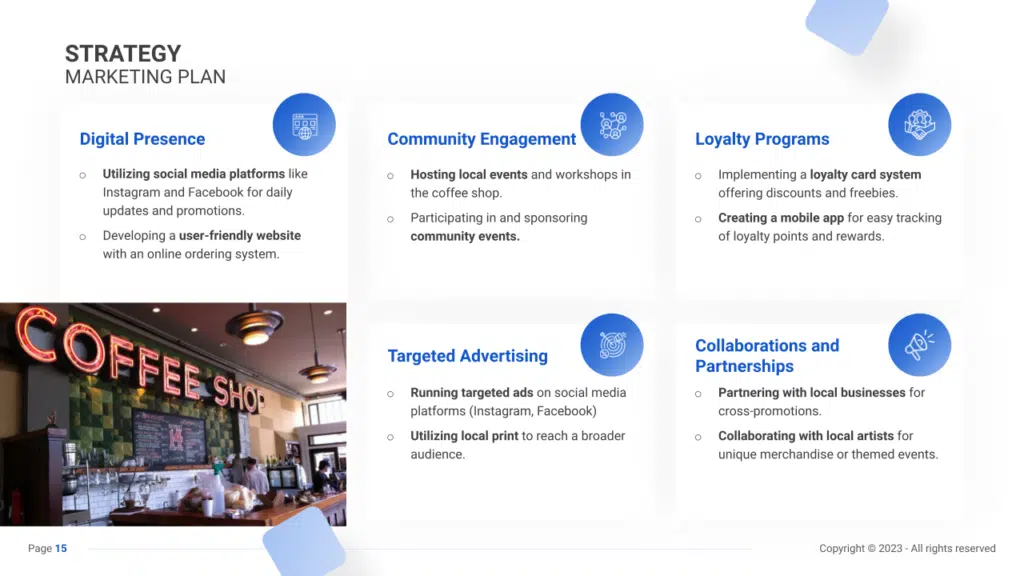
Sales Channels
Optimize sales channels to maximize revenue and customer satisfaction.
In-Store Upselling
Maximize each customer’s visit:
- Upsell Specialty Items: Train baristas to suggest specialty drinks, pastries, or merchandise based on customers’ preferences or current promotions.
- Merchandising: Display branded merchandise like travel mugs, brewing equipment, or specialty beans near the checkout counter to encourage additional purchases.
Subscription Services
Offer subscription-based models for regular income and customer retention:
- Coffee Delivery Subscription: Introduce a coffee delivery subscription service where customers receive their preferred coffee blends regularly at a discounted rate. Customize subscription options based on frequency and quantity to cater to diverse preferences.
- VIP Memberships: VIP memberships can provide exclusive benefits such as early access to new blends, members-only events, or personalized recommendations. These memberships create a sense of belonging and offer additional value to loyal customers.
Mobile Ordering and Pickup
Facilitate convenient ordering and pickup options:
- Mobile App Ordering: Develop a user-friendly mobile app that allows customers to browse your menu, place orders, and make payments seamlessly. Offer incentives such as loyalty points or app-exclusive deals, to encourage app usage.
- Curbside Pickup: Implement a curbside pickup option, allowing customers to order ahead and collect their beverages without leaving their vehicles. This convenience factor can attract busy individuals or those seeking contactless service.
Strategy Timeline
Lastly, set up a detailed timeline that marks important steps for the coffee shop’s start, marketing actions, growth in the number of customers, and goals for getting bigger. Make sure there’s a clear plan and goal for moving the business forward.
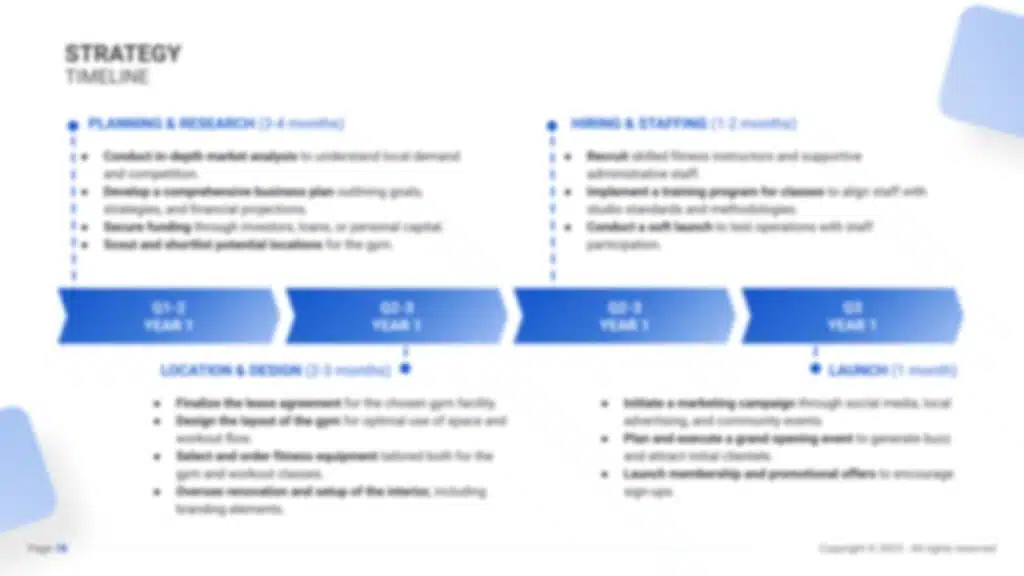
The Management section focuses on the coffee shop’s management and their direct roles in daily operations and strategic direction. This part is crucial for understanding who is responsible for making key decisions and driving the coffee shop toward its financial and operational goals.
For your coffee shop business plan, list the core team members, their specific responsibilities, and how their expertise supports the business.
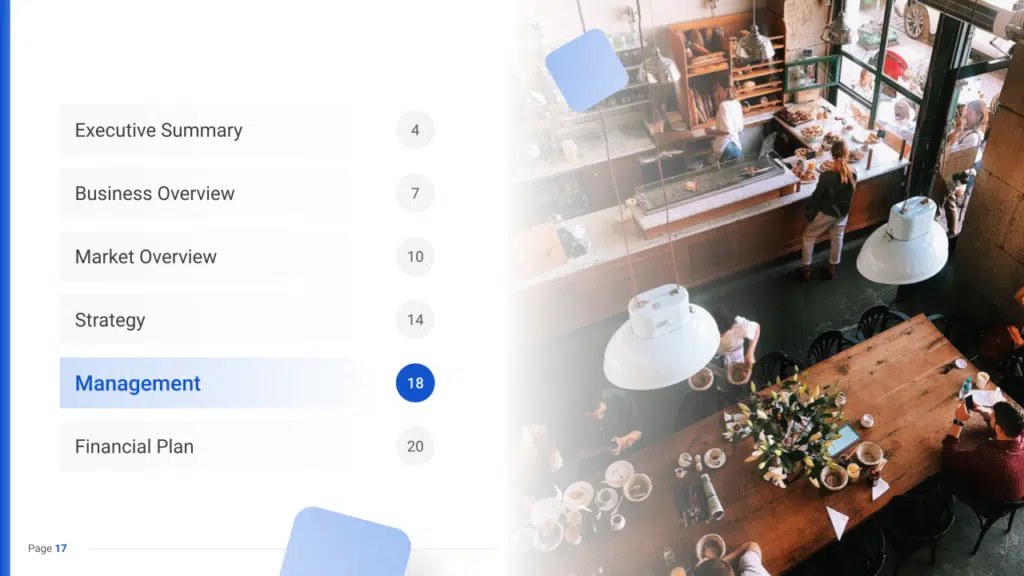
The Financial Plan section is a comprehensive analysis of your financial projections for revenue, expenses, and profitability. It lays out your coffee shop’s approach to securing funding, managing cash flow, and achieving breakeven.
This section typically includes detailed forecasts for the first 5 years of operation, highlighting expected revenue, operating costs and capital expenditures.
For your coffee shop business plan, provide a snapshot of your financial statement (profit and loss, balance sheet, cash flow statement), as well as your key assumptions (e.g. number of customers and prices, expenses, etc.).
Make sure to cover here _ Profit and Loss _ Cash Flow Statement _ Balance Sheet _ Use of Funds
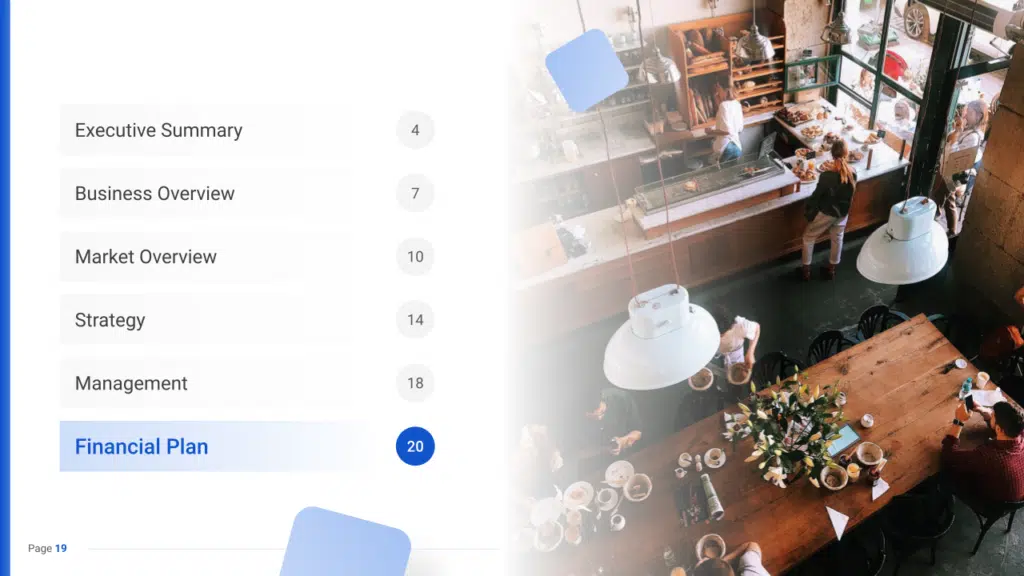
Related Posts

Steakhouse Business Plan Template & PDF Example
- Business Plan

Bubble Tea Business Plan Template & PDF Example

Bar Business Plan Template & PDF Example
Privacy overview.

COMMENTS
A coffee shop business plan is a comprehensive document that explains what your business idea is, how you intend to penetrate the coffee market, and the strategies you’ll employ to run your coffee shop s…
Explore a real-world coffee shop business plan example and download a free template with this information to start writing your own business plan.
A business plan proposal for a coffee shop covers market analysis, unique selling proposition, menu, location, marketing, operations, and financial projections. Brew with a strong comprehensive plan to win the hearts of the …
Create a successful coffee shop business plan PDF. Get a coffee shop business plan template to craft a detailed, effective strategy for your cafe business.
The planning process will ensure you understand the competitive landscape, price your coffee appropriately, and are ready to adapt to changing consumer preferences. This article will cover the steps necessary to write a …
Discover the essentials of a thriving coffee shop operation with our all-inclusive, step-by-step guide. Learn to craft a solid coffee shop business plan, from conducting market research to creating reliable financial forecasts.
Our coffee shop business plan is structured to cover all essential aspects needed for a comprehensive strategy. It outlines the shop’s operations, marketing strategy, market environment, competitors, management team, and …